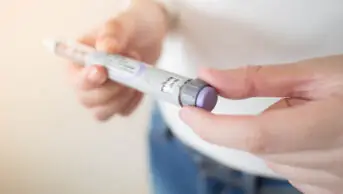
Shutterstock.com
With autumn well and truly underway, The Pharmaceutical Journal has covered some important seasonal challenges this week — from medicines shortages and funding to supporting trainees on new MPharm prescribing placements.
Seasons are changing in the wider pharmacy world too, with Geraldine McCaffrey appointed RPS director for Wales and a new interim chief executive at the General Pharmaceutical Council.
In addition, an exclusive investigation by The Pharmaceutical Journal revealed that applications to run an NHS distance-selling pharmacy (DSP) increased by 3,333% in a month in June 2025, after prospective contractors were given three weeks’ notice of market closure.
Read on for more health news you may have missed this week.
Phase I/II study hailed as Huntington’s “breakthrough”
A “groundbreaking” gene therapy could slow progression of Huntington’s disease and give patients decades of “good quality life”, the outcomes of a small-scale phase I/II study suggest.
Topline results suggest the drug, AMT-130, was generally well-tolerated, with a manageable safety profile. At a high dose, it also offered a statistically significant 75% slowing of disease progression as measured by the Composite Unified Huntington’s Disease Rating Scale (cUHDRS); statistically significant 60% slowing of disease progression as measured by total functioning capacity and other improved indicators of motor and cognitive function (i.e. high dose results observed at 36 months of follow up in 12 patients).
UK co-lead Sarah Tabrizi, professor of clinical neurology and director of University College London Huntington’s Disease Centre, said: “I believe these groundbreaking data are the most convincing in the field to date and underscore potential disease-modifying effects in Huntington’s disease, where an urgent need persists. These data indicate that AMT-130 has the potential to meaningfully slow disease progression — offering long-awaited hope to individuals and families impacted by this devastating disease.”
Further reading on treatments for neurological diseases:
Paracetamol in pregnancy and medicines misinformation
Pharmacists may have found themselves having conversations they never thought they’d have to this week, after US President Donald Trump claimed there was a causal link between paracetamol use in pregnancy and an increased risk of autism in children.
Meanwhile, the results of a survey published this week by the European Association of Urology and GSK found one in five UK adults think urinary tract infections (UTIs) can be prevented by taking antibiotics as a precaution.
Abstracts presented during the American Academy of Pediatrics 2025 National Conference & Exhibition at the Colorado Convention Center, held from 26–30 September 2025, will highlight the impact of social media “challenges” on misuse of over-the-counter antihistamines; as well as “eco-influencer” TikToks that contain contradictory medical information and one in five sexual health TikToks and one in four TikToks relating to abortion that contained inaccurate information.
Pharmacists are “trusted sources” who can help change the narrative
However, pharmacists can play a crucial role in changing the narrative around medicines misinformation.
In response to Trump’s comments, Claire Anderson, president of the Royal Pharmaceutical Society (RPS), urged patients to seek “sound advice” from pharmacists and other healthcare professionals, reassuring the public that paracetamol was safe to use in pregnancy.
In addition, new national commissioning will see community pharmacies offering children’s flu vaccines from next week — with high numbers of pharmacies offering the vaccine in areas with historically low coverage, such as London. “Pharmacy teams work in the heart of neighbourhoods and communities and hold trusted relationships with patients. With more pharmacies in more deprived areas, pharmacies are also well placed to drive vaccine coverage amongst underserved communities,” said Malcolm Harrison, chief executive of the Company Chemists’ Association.
Further reading on combatting medicines misinformation:
Vaccination urged as winter viruses “steadily increasing”
Meanwhile, a meta-analysis presented at the American Academy of Pediatrics 2025 National Conference and Exhibition highlights that COVID-19 vaccination during pregnancy is safe and beneficial for mother and infant.
Latest surveillance data from the UK Health Security Agency suggests flu and COVID-19 cases in “have been steadily increasing for several weeks”. A new Department of Health and Social Care campaign, entitled ‘Stay Strong. Get Vaccinated’, urges pregnant women to get vaccinated, using bubble wrap imagery to show how antibodies are passed through the placenta to protect newborns.


